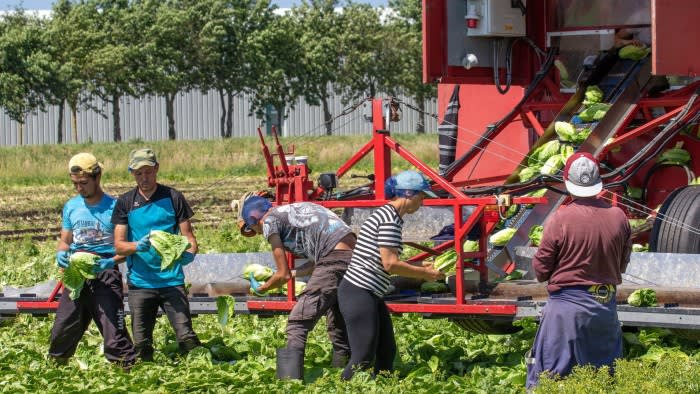Unlock the Editor’s Digest for free
Roula Khalaf, Editor of the FT, selects her favourite stories in this weekly newsletter.
The UK food industry should cover the upfront costs faced by migrant farm workers if it wants to keep access to the overseas labour it relies on, the government’s advisers on migration have said.
Farm workers coming to the UK are at risk of debt bondage because they often borrow money to cover flights and visas without knowing what they will earn, a report by the independent Migration Advisory Committee found.
To maintain current levels of food production, there was no immediate alternative given a lack of willing UK recruits to the seasonal worker scheme (SWS), the report published on Tuesday said, urging ministers to give industry certainty over the scheme’s future.
However, the report also said the industry and government had not done enough to stamp out abuses of workers’ rights in a scheme where they faced “an inherent imbalance of power” against employers.
The SWS allows UK growers to hire around 45,000 people a year on six-month visas.
The previous Conservative government said in May that the programme would run at least until 2029 but noted the aim would be to taper its size over time, while encouraging farmers towards automation.
Ministers should confirm visa numbers each year on a rolling basis, so the industry would in effect “have five years’ notice if the scheme were to be closed”, the MAC said.
Labour pledged before the general election on July 4 to reform the immigration system with a view to reducing overseas hiring, by making employers’ access to visas conditional on greater efforts to train UK workers.
However, it has not yet said what this will mean in practice or proposed any changes to the SWS.
But workers also need more certainty over how much they will earn, the committee added, calling for a guarantee of at least two months pay, to ensure they could recoup the costs of coming to the UK.
It urged the industry to accelerate action to move to an “employer pays principle”, so that recruitment and relocation expenses are borne by employers rather than workers.
An industry task force, including supermarkets, growers and recruiters, has said it will model ways an EPP model could work. But it has made slow progress because there is no consensus on how to share costs along the supply chain, given the tight margins imposed by retailers on UK growers.
The MAC said the task force needed to work faster and urged it to set a timeframe to present proposals. Ministers should then confirm the scheme’s continuation only if this timeframe was met, it said.
The committee noted that the government and employers needed to do more to inform workers of their legal rights and to enforce them through proactive inspections. It also called for a clearer process to refund income tax and help workers opt out of pension auto-enrolment.
Workers’ rights campaigners welcomed the committee’s recommendations. “All the risks of the seasonal worker scheme are on the workers, all the costs . . . It’s really important the government takes heed of this,” said Andy Hall, a migrant rights campaigner who has worked with the industry’s Stronger Together task force.
A government spokesperson said it would “carefully consider” the MAC’s findings and respond in “due course”.
Sophie De Salis, a sustainability policy adviser at the British Retail Consortium, said the task force’s study would be “a vital step” to understand how the EPP could be applied in practice.
It urged the government to adopt the MAC’s recommendations but also to scrap visa fees, arguing that these “heighten the financial risk to workers from the outset”.
The industry’s SWS task force said it acknowledged the committee’s call for its study to be conducted in a timely manner and was working closely with the Department for Environment, Food and Rural Affairs on the jointly-funded project.


